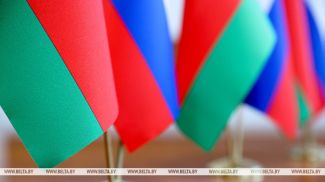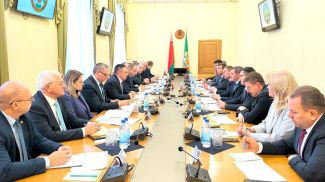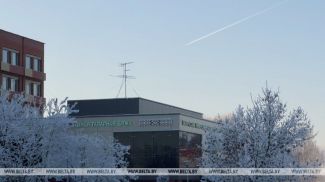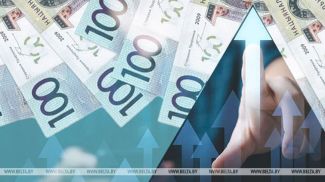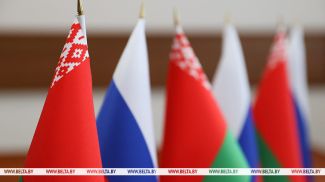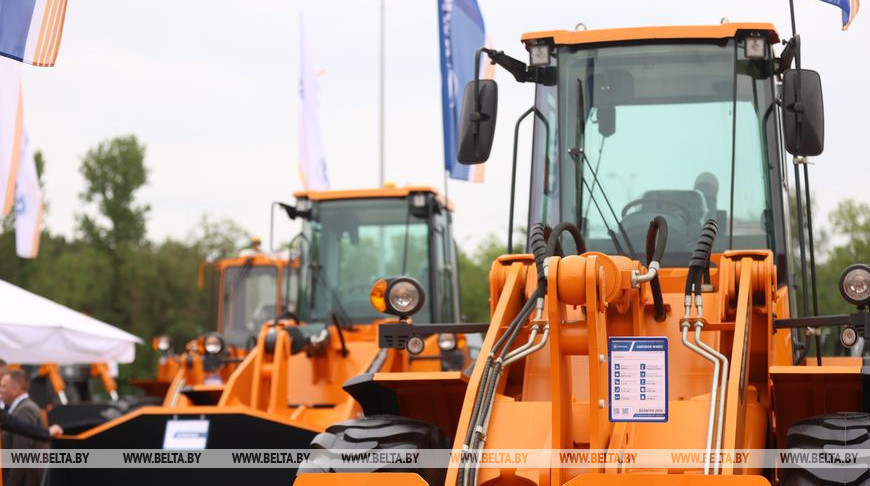
MINSK, 18 August (BelTA) - Amkodor holding company plans to overcome its current challenging situation by ramping up the output and utilizing government-proposed debt restructuring measures. These approaches will be formalized in a draft presidential decree discussed during Belarusian President Aleksandr Lukashenko's meeting with the Council of Ministers' leadership in Minsk on 18 August, BelTA learned.
The conceptual framework of the draft decree aimed at stabilizing the situation at Amkodor was reviewed during the meeting. The document received general approval from the president and, after prompt revisions, will be submitted for the head of state's signature, Deputy Prime Minister Viktor Karankevich told the media.
On the draft decree
According to him, the draft decree provides for the restructuring of Amkodor's debt obligations with the aim of their further effective use to increase production volumes, to ensure balanced financial flows and to complete the investment projects that are in an advanced stage of readiness.
In accordance with the plans of the government and the new company leadership, returns on investment projects are expected by 2026. Plans are in place to ramp up production of both components and finished machinery and to reduce operating costs. “This means significant production growth through effective import-substituting investment projects, which are already at an advanced stage. These projects will enable us to manufacture components domestically and expand our range of in-demand equipment,both for Belarus and export markets,” the vice prime minister said.
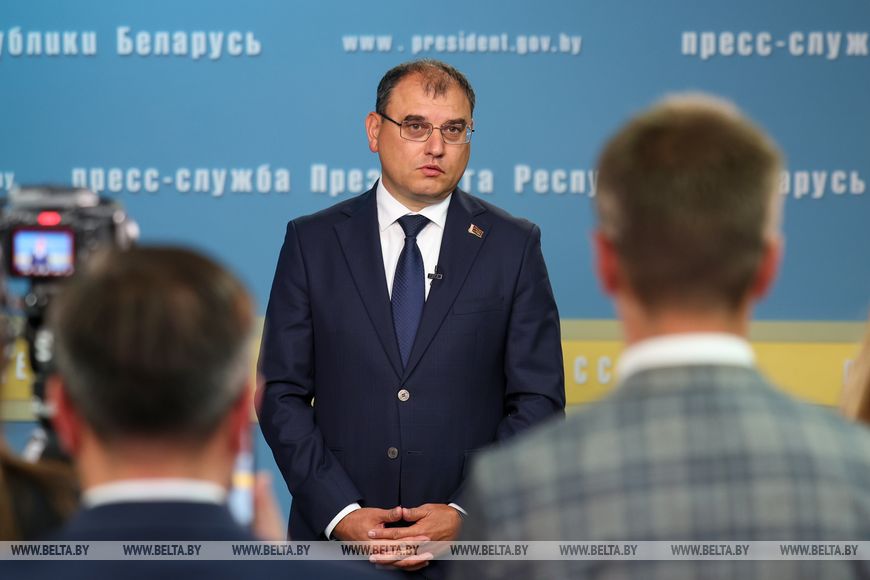
Currently, it is critical to mobilize the enterprise's resources toward two priorities: producing in-demand machinery and fulfilling existing contractual obligations. The next phase involves securing new contracts in both domestic and international markets. “First, we must achieve production volumes that ensure stable, profitable operations. Then we'll gradually expand our product range and scale up output,” Viktor Karankevich emphasized.
The core operational priorities will be formalized in Amkodor's development strategy, which is expected to be included in the draft presidential decree.
On additional funding
During the meeting, the president tasked officials with developing a comprehensive financial recovery plan for the holding company to prevent future requests for state support. “I've said it repeatedly: We must abandon this 'pants-holding' practice [of propping up failing enterprises]. Budget funds are people's money and we have a lot of important areas for these investments,” the president emphasized.
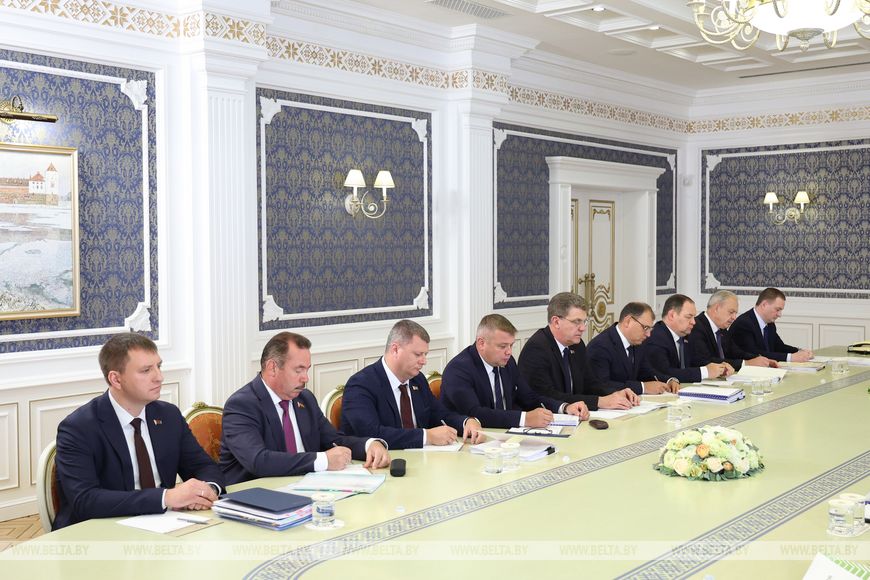
When asked about potential additional state financial injections, Viktor Karankevich clarified: “The debt restructuring framework includes various possible mechanisms. Among them is resource allocation to facilitate further debt reorganization.”
"All resources [borrowed from the state] must be repaid ultimately, but within a defined timeframe and through an appropriate mechanism,” the vice prime minister emphasized. "Specifically, fixed percentages of revenue will be allocated to settle obligations. This approach will stabilize the enterprise's financial position and balance cash flows.”
On production growth and workforce retention
One of the head of state’s key demands for the holding company was to preserve the workforce. Following the meeting, journalists asked Amkodor Director General Aleksandr Yefimov whether the company is planning staff reductions or wage cuts. “There is no need for concern in this regard because Amkodor is focused on increasing production volumes, by at least two times compared to the current year by 2030,” he stated.
The executive emphasized that the company would continue expanding its product range while maximizing production localization. These are the objectives set by the president himself.
Amkodor's developed in-house component base has enabled stable operations during challenging times following certain restrictions. “We will maintain this course by broadening our product line (focusing on those with high margin profit) and further localizing production at our component manufacturing facilities,” Aleksandr Yefimov explained.
plans also include completing 10 investment projects, including import-substitution initiatives with Russian partners.
“The team is optimistic. Everyone is focused on delivering strong results in line with the president's directives for our enterprises,” Aleksandr Yefimov said.
Regarding new product development, he clarified this would not contradict the president's core requirements. During the meeting, Aleksandr Lukashenko suggested that Amkodor's difficulties might stem from pursuit of diversification, stressing the need to concentrate resources on high-demand, high-volume equipment models.
Aleksandr Yefimov confirmed the company would adopt precisely this approach – evaluating product profitability and prioritizing maximum returns during design and production phases. “Our research priorities will concentrate on economically viable product diversification,” he said. adding: “In today's world, maintaining position without diversifying is unfortunately difficult. Progress requires this forward movement, though we will pursue it selectively and pinpointedly."
On competition
The executive noted that the Amkodor enterprises operate in highly competitive markets where advantage goes to those balancing cost efficiency with quality. “We are actively optimizing costs to reduce end prices while bringing our machines’ technical parameters to global standards. Combined, these factors will help us not just survive but gradually expand our presence, particularly in our traditional export market, the Russian Federation.”
For instance, Amkodor's loaders cost half their Western counterparts' price while being slightly pricier than Asian versions. However, domestic production offers national advantages: retained gross value added, tax revenues, jobs, technology development and related industry growth.
To enhance the competitiveness of domestic manufacturers, the government implements support measures, including within the Union State framework. “This approach alone ensures competitiveness. Chinese producers manufacture about 200,000 loaders annually. We can make 2,000. No country can withstand such pure competition due to economies of scale. But we recognize our technological sovereignty depends on supporting and developing domestic production, the key factor for strengthening our domestic market position,” Aleksandr Yefimov stressed.




